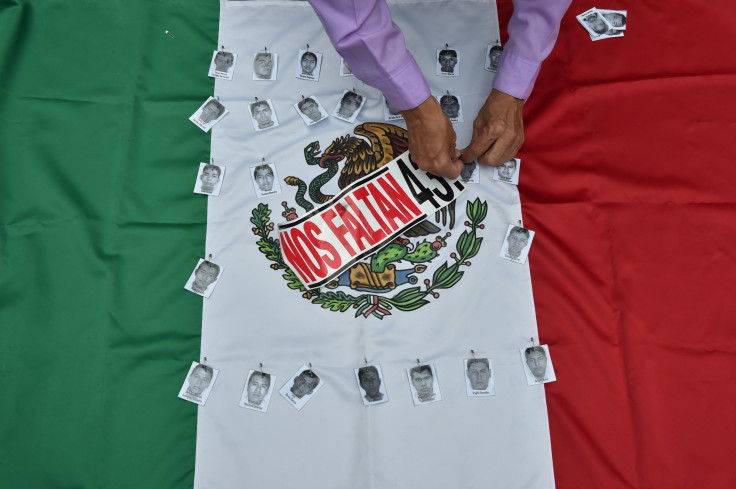Marchers Fill Mexico City Streets To Remember Ayotzinapa School Students Who Vanished In Iguala A Year Ago

Carrying photos of 43 rural school students who vanished a year ago Saturday, thousands took to the streets of Mexico City demanding justice for the disappearance and presumed massacre of the victims. The demonstrations follow a recent report from an independent human rights group rejecting the official account of what happened in Iguala, Guerrero state, Sept. 26, 2014, which suggests security forces and organized criminal gangs worked together to kill the students.
"We will march with energy. We can't rest in our search" for the students, Felipe de la Cruz, a spokesman for the families of the missing students, told Agence France-Presse. The students, from the Ayotzinapa Rural Teachers’ College, were taken into custody by local authorities after commandeering buses to take them to a demonstration in Mexico City and then disappeared. The remains of only two students have been confirmed by forensic specialists.
The disappearance happened as Mexico grappled (and continues to grapple) with controversial education policy reforms that rural teachers say treat poor, rural school districts unfairly. Guerrero state, home to the Pacific coastal tourist city of Acapulco, is one of Mexico’s poorest and most dangerous.
What happened to the 43 #Ayotzinapa students?
New information casts doubt on the government’s claims.
https://t.co/wCbLNfTDLC
— AJ (@ajplus) September 24, 2015Activists told the Associated Press they hoped the march would help bring justice by keeping the public’s attention on the as-of-yet-unresolved case. Though the marches were smaller than ones over the past year, the New York Times estimated 50,000 people turned out in the country’s capital Saturday.
The federal government’s investigation into the disappearance concluded Iguala’s mayor ordered police to go after the students out of fear they would interrupt a speech his wife was giving that afternoon. The police then allegedly turned the students over to a local gang, the Guerreros Unidos, who killed them and burned their bodies in a dumpster in the nearby town of Cocula, according to the government's report.
But a report released last month from the regional human rights authority, the Inter-American Commission on Human Rights, rejected the Mexican government’s description of events. Among other allegations, the report states federal security forces had been tracking the students throughout the day and were at two of the scenes where the students were later attacked. If the report’s allegations are true, then the students were kidnapped with the involvement of state and federal police, who then collaborated with organized criminals to murder and dispose of the bodies.
© Copyright IBTimes 2025. All rights reserved.






















